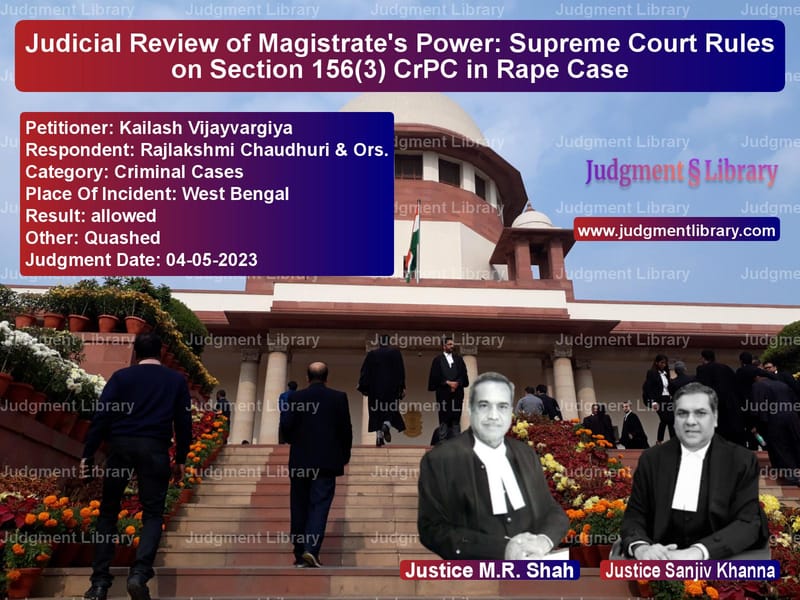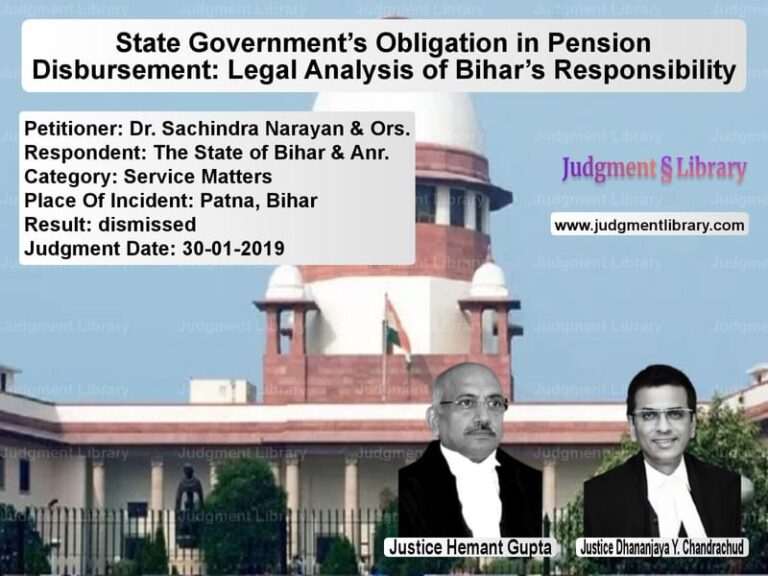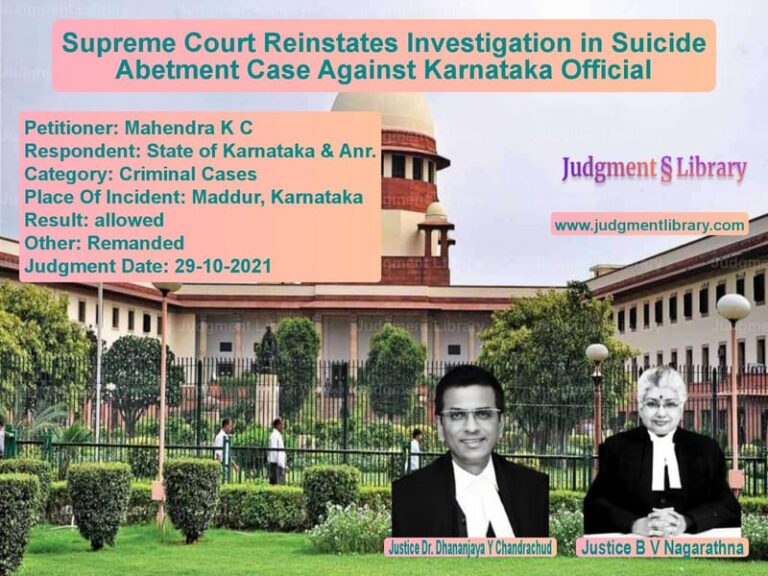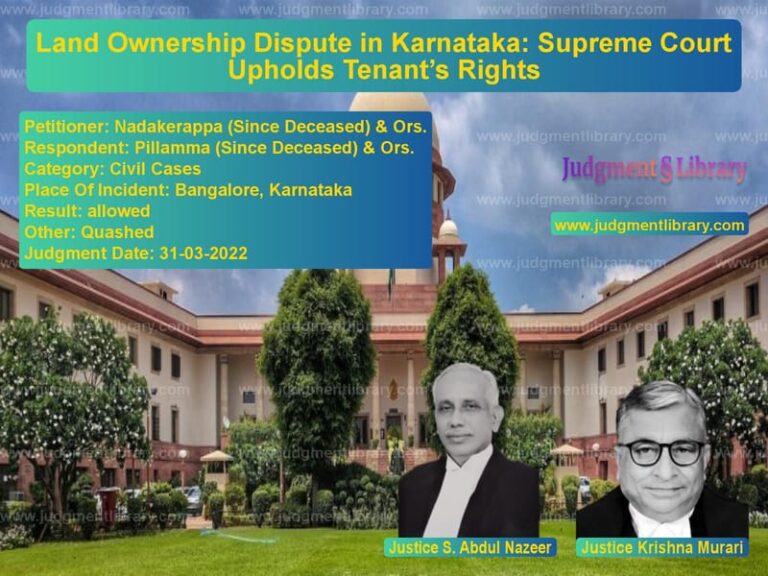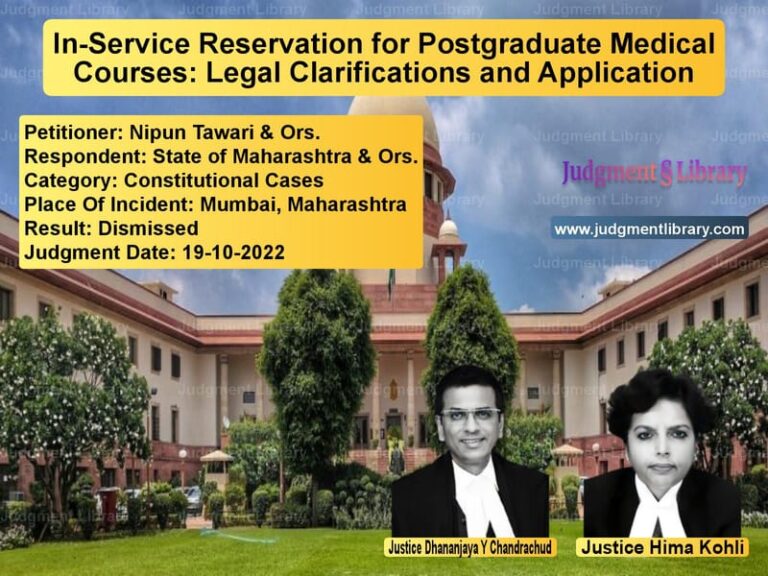Judicial Review of Magistrate’s Power: Supreme Court Rules on Section 156(3) CrPC in Rape Case
The Supreme Court of India, in the case of Kailash Vijayvargiya vs. Rajlakshmi Chaudhuri & Ors., examined the legal scope of a Magistrate’s power under Section 156(3) of the Code of Criminal Procedure (CrPC) in ordering the registration of a First Information Report (FIR). The case revolved around a rape allegation lodged after two years of the alleged incident, raising issues of credibility, delay, and procedural requirements for ordering an investigation.
Background of the Case
The complainant, Rajlakshmi Chaudhuri, a member of the Bhartiya Janata Party (BJP) in West Bengal, filed an application under Section 156(3) CrPC before the Chief Judicial Magistrate (CJM), Alipore, alleging that she was raped on November 29, 2018, by three national-level BJP leaders, including Kailash Vijayvargiya. She claimed that the accused had called her to discuss a separate criminal case but instead sexually assaulted her.
After the incident, the complainant allegedly approached multiple police stations and higher authorities but was denied registration of her complaint. In response, she filed an application before the CJM, seeking an order for police investigation.
Legal Issues Considered
The Supreme Court had to decide on the following legal questions:
- Whether a Magistrate has the power to verify the truth and veracity of allegations while deciding an application under Section 156(3) CrPC.
- Whether the High Court correctly applied the precedent set in Lalita Kumari vs. Govt. of Uttar Pradesh (2014) in quashing the CJM’s order.
- The impact of a two-year delay in filing the rape complaint on the judicial process.
Petitioners’ Arguments
The accused, represented by Senior Advocates Mahesh Jethmalani, Maninder Singh, and P.S. Patwalia, contended that:
- The High Court erred in quashing the CJM’s well-reasoned order dismissing the application under Section 156(3) CrPC.
- The CJM was within its jurisdiction to verify the credibility of the allegations, especially considering the two-year delay in filing the complaint.
- The complainant had previously filed multiple police complaints against the accused but never mentioned the rape allegation until 2020.
- Relying on the precedent set in Priyanka Srivastava vs. State of Uttar Pradesh (2015), the Magistrate has discretion to examine the truth and veracity of allegations before directing an investigation.
- The High Court incorrectly applied Lalita Kumari, which only applies to police officers, not Magistrates deciding applications under Section 156(3) CrPC.
Respondents’ Arguments
The complainant, represented by Senior Advocate Bikash Ranjan Bhattacharya, countered that:
- Under Lalita Kumari, a Magistrate has no authority to assess the veracity of allegations at the pre-investigation stage.
- Since the complaint disclosed a cognizable offense, the police were duty-bound to register an FIR.
- The delay in filing the complaint was due to threats and intimidation by the accused.
- The CJM’s refusal to direct an investigation violated the complainant’s fundamental rights under Article 21 of the Constitution.
Supreme Court’s Observations
Scope of Magistrate’s Power Under Section 156(3) CrPC
The Supreme Court analyzed the legal distinction between the duties of a police officer under Section 154 CrPC and the Magistrate’s power under Section 156(3) CrPC. It observed that:
- A police officer must register an FIR upon receiving information of a cognizable offense, as held in Lalita Kumari.
- A Magistrate, however, has discretion under Section 156(3) CrPC to examine whether the complaint warrants an investigation.
- The judgment in Priyanka Srivastava mandates that a Magistrate must apply judicial mind before directing an investigation.
Delay in Filing the Complaint
The Court noted that:
- The complainant had filed multiple police complaints against the accused over two years but never mentioned the rape allegation.
- There was no plausible explanation for the delay in lodging the rape complaint.
- The delay created reasonable doubt about the veracity of the allegations, which justified the CJM’s decision to dismiss the complaint.
High Court’s Erroneous Reliance on Lalita Kumari
The Supreme Court held that the High Court misapplied the principles of Lalita Kumari by extending its scope to a Magistrate’s judicial discretion under Section 156(3) CrPC. It emphasized that:
- Lalita Kumari governs police conduct, while Priyanka Srivastava sets guidelines for Magistrates under Section 156(3).
- The CJM acted correctly in scrutinizing the complaint before directing an investigation.
Final Judgment
The Supreme Court ruled that:
- The High Court’s order quashing the CJM’s decision was incorrect and is set aside.
- The CJM was right in verifying the truth and veracity of the allegations before ordering an investigation.
- The complaint’s unexplained two-year delay raised serious doubts about its credibility.
- The registration of an FIR based on the High Court’s order is also quashed.
Key Takeaways
- Magistrate’s Discretion: A Magistrate can assess the truth and veracity of allegations before directing an investigation under Section 156(3) CrPC.
- Delay in Rape Complaints: Unexplained delays in filing complaints, especially serious allegations like rape, can be grounds for judicial scrutiny.
- Application of Lalita Kumari: The judgment clarifies that Lalita Kumari applies only to police officers, not Magistrates acting under Section 156(3).
- Role of High Courts: High Courts must apply judicial precedents carefully and avoid misinterpreting the scope of Lalita Kumari in cases involving judicial discretion.
Conclusion
The Supreme Court’s decision reinforces the importance of judicial discretion in directing police investigations. It ensures that the power under Section 156(3) CrPC is exercised judiciously and prevents frivolous or politically motivated complaints from being registered as FIRs without preliminary scrutiny.
Read also: https://judgmentlibrary.com/supreme-court-rejects-mercy-petition-in-beant-singh-assassination-case/
Petitioner Name: Kailash Vijayvargiya.Respondent Name: Rajlakshmi Chaudhuri & Ors..Judgment By: Justice M.R. Shah, Justice Sanjiv Khanna.Place Of Incident: West Bengal.Judgment Date: 04-05-2023.
Don’t miss out on the full details! Download the complete judgment in PDF format below and gain valuable insights instantly!
Download Judgment: kailash-vijayvargiya-vs-rajlakshmi-chaudhuri-supreme-court-of-india-judgment-dated-04-05-2023.pdf
Directly Download Judgment: Directly download this Judgment
See all petitions in Bail and Anticipatory Bail
See all petitions in Custodial Deaths and Police Misconduct
See all petitions in SC/ST Act Case
See all petitions in Judgment by Mukeshkumar Rasikbhai Shah
See all petitions in Judgment by Sanjiv Khanna
See all petitions in allowed
See all petitions in Quashed
See all petitions in supreme court of India judgments May 2023
See all petitions in 2023 judgments
See all posts in Criminal Cases Category
See all allowed petitions in Criminal Cases Category
See all Dismissed petitions in Criminal Cases Category
See all partially allowed petitions in Criminal Cases Category

